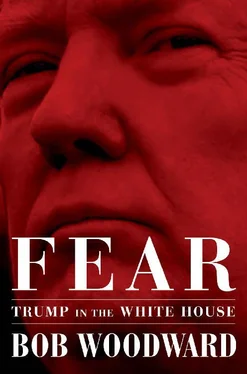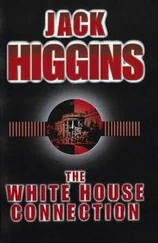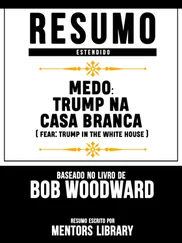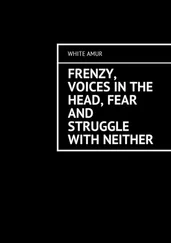Bob Woodward - Fear - Trump in the White House
Здесь есть возможность читать онлайн «Bob Woodward - Fear - Trump in the White House» весь текст электронной книги совершенно бесплатно (целиком полную версию без сокращений). В некоторых случаях можно слушать аудио, скачать через торрент в формате fb2 и присутствует краткое содержание. Город: New York, Год выпуска: 2018, ISBN: 2018, Издательство: Simon & Schuster, Жанр: Публицистика, Политика, на английском языке. Описание произведения, (предисловие) а так же отзывы посетителей доступны на портале библиотеки ЛибКат.
- Название:Fear: Trump in the White House
- Автор:
- Издательство:Simon & Schuster
- Жанр:
- Год:2018
- Город:New York
- ISBN:978-1-5011-7551-0
- Рейтинг книги:3 / 5. Голосов: 1
-
Избранное:Добавить в избранное
- Отзывы:
-
Ваша оценка:
- 60
- 1
- 2
- 3
- 4
- 5
Fear: Trump in the White House: краткое содержание, описание и аннотация
Предлагаем к чтению аннотацию, описание, краткое содержание или предисловие (зависит от того, что написал сам автор книги «Fear: Trump in the White House»). Если вы не нашли необходимую информацию о книге — напишите в комментариях, мы постараемся отыскать её.
Fear: Trump in the White House — читать онлайн бесплатно полную книгу (весь текст) целиком
Ниже представлен текст книги, разбитый по страницам. Система сохранения места последней прочитанной страницы, позволяет с удобством читать онлайн бесплатно книгу «Fear: Trump in the White House», без необходимости каждый раз заново искать на чём Вы остановились. Поставьте закладку, и сможете в любой момент перейти на страницу, на которой закончили чтение.
Интервал:
Закладка:
Bob Woodward
FEAR
TRUMP IN THE WHITE HOUSE
To Elsa
“Real power is—I don’t even want to use the word—fear.”
Presidential candidate Donald J. Trump in an interview with Bob Woodward and Robert Costa on March 31, 2016, at the Old Post Office Pavilion, Trump International Hotel, Washington, D.C.
Author’s Personal Note
A heartfelt thanks to Evelyn M. Duffy, my assistant on five books that have covered four presidents. President Trump presents a particular hurdle because of the deep emotions and passions he brings out in supporters and critics. Evelyn immediately grasped that the challenge was to get new information, authenticate it and put it in context while reporting as deeply as possible inside the White House.
Evelyn knew this was history and we had to get as much as possible quickly while memories were fresh and documentation and notes still available. At times we researched, interviewed, transcribed and rewrote sections of the book in a day or two covering foreign policy from North Korea to Afghanistan and the Middle East; and on the full range of domestic issues from trade, immigration and taxes.
She made sure we built the story around specific scenes with specific dates, named participants and accounts of what happened. Evelyn maintains a remarkable work ethic and the deepest sense of fairness, curiosity and honesty. She provided me with thick packets of research, background, chronologies, clips, her insights, a list of major unanswered questions and additional interviews to pursue.
Evelyn brought her endless good sense and wisdom, serving as full collaborator and in the spirit—and with the level of effort—of a coauthor.
Note to Readers
Interviews for this book were conducted under the journalist ground rule of “deep background.” This means that all the information could be used but I would not say who provided it. The book is drawn from hundreds of hours of interviews with firsthand participants and witnesses to these events. Nearly all allowed me to tape-record our interviews so the story could be told with more precision. When I have attributed exact quotations, thoughts or conclusions to the participants, that information comes from the person, a colleague with direct knowledge, or from meeting notes, personal diaries, files and government or personal documents.
President Trump declined to be interviewed for this book.
PROLOGUE

In early September 2017, in the eighth month of the Trump presidency, Gary Cohn, the former president of Goldman Sachs and the president’s top economic adviser in the White House, moved cautiously toward the Resolute Desk in the Oval Office.
In his 27 years at Goldman, Cohn—6-foot-3, bald, brash and full of self-confidence—had made billions for his clients and hundreds of millions for himself. He had granted himself walk-in privileges to Trump’s Oval Office, and the president had accepted that arrangement.
On the desk was a one-page draft letter from the president addressed to the president of South Korea, terminating the United States–Korea Free Trade Agreement, known as KORUS.
Cohn was appalled. For months Trump had threatened to withdraw from the agreement, one of the foundations of an economic relationship, a military alliance and, most important, top secret intelligence operations and capabilities.
Under a treaty dating back to the 1950s, the United States stationed 28,500 U.S. troops in the South and operated the most highly classified and sensitive Special Access Programs (SAP), which provided sophisticated Top Secret, codeword intelligence and military capabilities. North Korean ICBM missiles now had the capability to carry a nuclear weapon, perhaps to the American homeland. A missile from North Korea would take 38 minutes to reach Los Angeles.
These programs enabled the United States to detect an ICBM launch in North Korea within seven seconds. The equivalent capability in Alaska took 15 minutes—an astonishing time differential.
The ability to detect a launch in seven seconds would give the United States military the time to shoot down a North Korean missile. It is perhaps the most important and most secret operation in the United States government. The American presence in South Korea represents the essence of national security.
Withdrawal from the KORUS trade agreement, which South Korea deemed essential to its economy, could lead to an unraveling of the entire relationship. Cohn could not believe that President Trump would risk losing vital intelligence assets crucial to U.S. national security.
This all stemmed from Trump’s fury that the United States had an $18 billion annual trade deficit with South Korea and was spending $3.5 billion a year to keep U.S. troops there.
Despite almost daily reports of chaos and discord in the White House, the public did not know how bad the internal situation actually was. Trump was always shifting, rarely fixed, erratic. He would get in a bad mood, something large or small would infuriate him, and he would say about the KORUS trade agreement, “We’re withdrawing today.”
But now there was the letter, dated September 5, 2017, a potential trigger to a national security catastrophe. Cohn was worried Trump would sign the letter if he saw it.
Cohn removed the letter draft from the Resolute Desk. He placed it in a blue folder marked “KEEP.”
“I stole it off his desk,” he later told an associate. “I wouldn’t let him see it. He’s never going to see that document. Got to protect the country.”
In the anarchy and disorder of the White House, and Trump’s mind, the president never noticed the missing letter.
Ordinarily Rob Porter, the staff secretary and organizer of presidential paperwork, would have been responsible for producing letters like this to the South Korean president. But this time, alarmingly, the letter draft had come to Trump through an unknown channel. Staff secretary is one of the low-profile but critical roles in any White House. For months, Porter had been briefing Trump on decision memos and other presidential documents, including the most sensitive national security authorizations for military and covert CIA activities.
Porter, 6-foot-4, rail-thin, 40 years old and raised a Mormon, was one of the gray men: an organization man with little flash who had attended Harvard and Harvard Law School and been a Rhodes Scholar.
Porter later discovered there were multiple copies of the draft letter, and either Cohn or he made sure none remained on the president’s desk.
Cohn and Porter worked together to derail what they believed were Trump’s most impulsive and dangerous orders. That document and others like it just disappeared. When Trump had a draft on his desk to proofread, Cohn at times would just yank it, and the president would forget about it. But if it was on his desk, he’d sign it. “It’s not what we did for the country,” Cohn said privately. “It’s what we saved him from doing.”
It was no less than an administrative coup d’état, an undermining of the will of the president of the United States and his constitutional authority.
In addition to coordinating policy decisions and schedules and running the paperwork for the president, Porter told an associate, “A third of my job was trying to react to some of the really dangerous ideas that he had and try to give him reasons to believe that maybe they weren’t such good ideas.”
Читать дальшеИнтервал:
Закладка:
Похожие книги на «Fear: Trump in the White House»
Представляем Вашему вниманию похожие книги на «Fear: Trump in the White House» списком для выбора. Мы отобрали схожую по названию и смыслу литературу в надежде предоставить читателям больше вариантов отыскать новые, интересные, ещё непрочитанные произведения.
Обсуждение, отзывы о книге «Fear: Trump in the White House» и просто собственные мнения читателей. Оставьте ваши комментарии, напишите, что Вы думаете о произведении, его смысле или главных героях. Укажите что конкретно понравилось, а что нет, и почему Вы так считаете.












